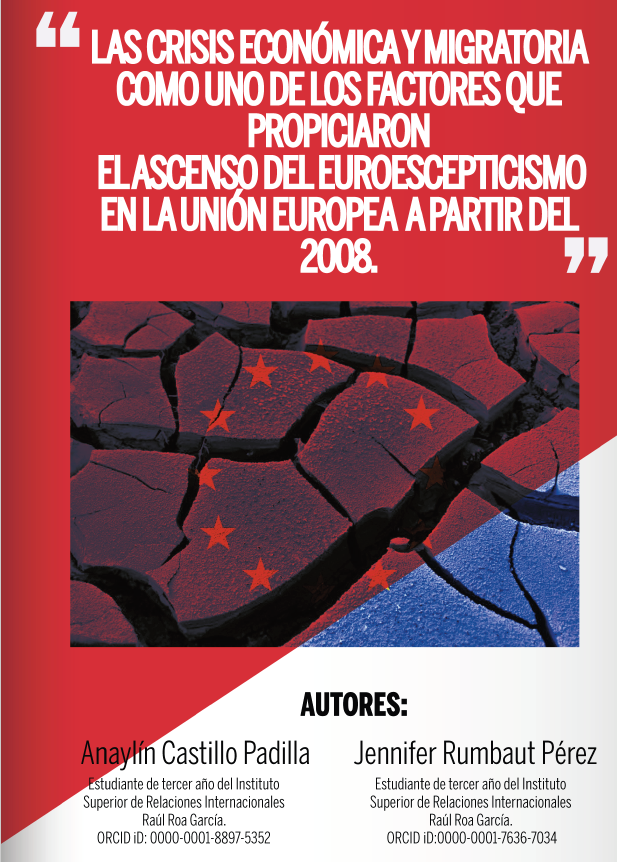The economic and migratory crises as one of the factors that led to the rise of Euroscepticism within the European Union since 2008.
Keywords:
Economic crisis, migratory crisis, Euroscepticism, Europeanism, European Union.Abstract
The Euroscepticism, which is against European Union(EU), has been present since the beginning of the organization. This attitude can be appreciated in many governments as well as in different civilian organizations. Nowadays, the Euroscepticism is more present but it is not similar in all countries. This Eurosceptic peak has been a result, among other factors, of the economic and migratory crisis, which are affected this region since 2008. From this situation, many parties in opposition to the traditional ones, have come up or have strengthened themselves, and they show their rejection to refugees and immigrants, or only express their refusal to the integration in the continent.
Downloads
References
Álvarez, M. V. (2012). El euroescepticismo en una Unión Europea en crisis: ¿viejo fenómeno en nuevos odres? Revista Integración y Cooperación Internacional, (pp 4-17).
Bendel, P. (2017). La crisis de la política . El estado de la Unión Europea , pp.93-105.
Blanch, A. A. (2014). Crisis económica y Euroescepticismo . Estudios de Pregreso.
Busutil, R. O., & Márquez, Y. P. (15 de enero de 2017). La crisis migratoria en el Mediterráneo y la Unión Europea: principales políticas y medidas antinmigrantes. Obtenido de ScieELO: http://www.scielo.sld.cu
Comisión Española de Ayuda al Refugiado. (2020).
Devia-Garzón, C. A., & Bautista-Safar, T. (2017). La realidad de la crisis migratoria europea . Entramado, p. 144-156 .
Domínguez. (2017). Europa en el ocaso del milenio. Un estudio sobre el capitalismo europeo en el cambio de época. La Habana: Editorial de Ciencias Sociales.
Ecured. (2018). Obtenido de http://www.ecured.cu
Guzmán, G. R., & García, C. M. (2010). La Unión Europea en cisis: 2008-2009. Problemas del desarrollo, vol. 41 no.161.
Hall, P. A. (2019). La crisis del euro y el futuro de la integración Europea. Obtenido de OpenMind BBVA: http://www.bbvaopenmind.com
López, R. (2016). Factores que han condicionado la crisis migratoria en el Mediterráneo (2011-2016). Proyecto de Investigación para Trabajo de Diploma. La Habana.
Montero, J. M. (septiembre de 2016). Cambios en los sistemas de partidos europeos: austeridad, euroescepticismo y partidos emergentes . Madrid, España: FACULTAD DE CIENCIAS POLÍTICAS Y SOCIOLOGÍA .
Nejad, A. S. (7 de marzo de 2016). La crisis migratoria europea: un análisis. Obtenido de OpenMind BBVA: http://www.bbvaopenmind.com
Organización Internacional de las Migraciones. (2017).
Pereira, J. L. (diciembre de 2019). El avance de las fuerzas euroescépticas al interior de la Unión Europea en el período de 2008-2018. Factores determinantes. La Habana, Cuba.
Rodríguez, M. C. (s.f.). LA UNIÓN EUROPEA EN EL CONTEXTO DE LA CRISIS DE LOS REFUGIADOS. Grado en publicidad y relaciones públicas. Universitat de Girona, Girona.
Rodríguez, S. L. (2017). El auge del Euroescepticismo en Europa: ¿el fin de un proyecto o una crisis coyuntural? Tiempo Presente.
Tamanes, R. (2012). La Economía Internacional del Siglo XXI. España: Fundacion Cajamar .
Vanbiervliet, S. A. (2017). Las crisis de la Unión Europea: ¿una aplicación de la Ley de Murphy? Agenda Internacional , pp. 9-28 .
Villaverde, J. F., & Santos, T. (2019). La crisis de la Unión Europea. El país.
Weber, C. S. (2015). La Euro Crisis. Causas y síntomas . Estudios Fronterizos, nueva época, vol 16. no.32.

Downloads
Published
How to Cite
Issue
Section
License
Copyright (c) 2021 Revista Científica Universitaria Ad Hoc

This work is licensed under a Creative Commons Attribution-NonCommercial 4.0 International License.











